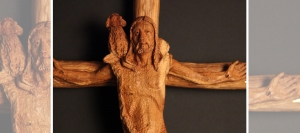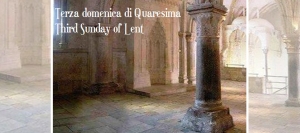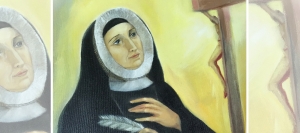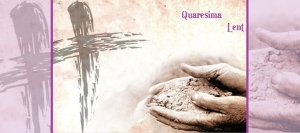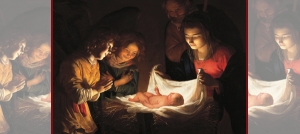Redazione
Week IV - Fraternity: Dreaming Together - "His works were done in God." (Jn 3:21)
Our gaze on this Fourth Sunday of Lent is turned to Jesus on the cross at the supreme moment of his love for all humanity. By looking to him and believing in him we are saved.
The Gospel passage proposed by the liturgy is taken from the dialogue between Jesus and Nicodemus and reveals something grandiose to us. Jesus says “God so loved the world that he gave his only Son, so that whoever believes will not be lost but have eternal life.” God so loved the world: I loved it "so much,” in a way so great that there is no greater. Here is the infinite, the immense love of God for the world, for humanity, for each one of us. Jesus continues: “God did not send the Son into the world to condemn the world but so that the world might be saved through him.”
God does not condemn. God loves, God suffers, God saves. There is something important to learn here: as humans we may condemn, point the finger, highlight the negative things, the dramas, the sins. God loves the world as it is, precisely because it is in sin, Jesus comes to save it. The crucified Son is the Light, the Truth, the victory over darkness and sin. Before Him we must make a choice because He is the Way, the Truth and the Life. The Cross is the credible sign that a life given always has value, even beyond death.
God loves the world, loves it infinitely. To believe in the Light is to choose life, eternal life that is full, divine and overflowing.
For this unprecedented time, Pope Francis' desire "to revive among all a worldwide aspiration for fraternity in order to dream together and make life a beautiful adventure" (FT 9) is far-reaching.
Jesus came into the world, he gave his life so that this dream of unity could be realized: fraternity, this dream of love for all humanity.
Life in common is an expression of beauty, it is a reality that touches us and forms us deeply. No one can open up to existence alone and each person we meet always helps us to achieve the goal of our inner growth. We need "a community that supports us,” says the Holy Father, "that helps us and in which we help each other to look ahead, to dream together.”
Jesus called each of us to share this dream of unity, to be artisans of communion, ready to pay a price, a cost with our lives, to be women and men of faith who affirm that fraternity is determined by a familiarity founded on the acceptance of God's will in the unconditional gift of ourselves.
I want to ask myself: What do I value about the fraternity that I live and that cost Jesus his life? How does it help me in seeking God's will?
May the Lord give us the grace to believe in love, to love our fraternities, always seeking to respond to the will of the Father.
Week III - Fraternity is Care - "What is weakness is strength." (Cf. 1 Cor 1:25)
The Gospel of this Third Sunday of Lent presents us with a Jesus we would not expect to see. John tells us, “The Passover of the Jews was approaching, and Jesus went up to Jerusalem. In the temple he found people selling oxen, sheep, and doves, and sitting there were the money changers. Then he made a whip of cords and drove them all out of the temple, along with the sheep and the oxen; he threw the money of the moneychangers to the ground and overturned their stalls, and to the dove sellers he said, ‘Take these things away from here and do not make my Father's house a marketplace!’"
Jesus knows that in our hearts dwells the temptation of the merchant. The temptation to possess and manage creation and creatures as objects to take and sell, to appropriate and use to feel a little more secure. This is the temptation to become masters, to live the illusion of being masters of one's own life. Things created and given to us, therefore, become magnets for small or large attachments. Even relationships and people progressively fall into the utilitarian category of idols to be worshipped for our own self-satisfaction.
Jesus knows our weakness. He asks us to risk breaking with our formalities, He proposes that we destroy the walls in which we hide this weakness of ours and trust in Him.
He knows that in our hearts dwells an infinite need for trust! And trust is the fertile ground for an authentic freedom, for an adherence to the true law of love....
There is no humanity that is not wounded, from the point of view of fraternity and Pope Francis, faced with the many diseases that mark it suggests a specific "cure" based on gratuitousness and tenderness. Gratuity is the human dimension that allows one to "do some things for the mere fact that in themselves they are good, without hoping to get any result from them, without immediately expecting something in return." (Ft 139) We welcome people because they are different, not because they are useful. This attitude of conscience makes our humanity grow and shapes our witness. Tenderness, on the other hand, "is love that becomes close and concrete. It is a movement that starts from the heart and reaches the eyes, ears and hands" (FT194) and it is the inner strength that has the courage to appear in concrete gestures of service.
We are encouraged to commit ourselves to taking care of our relationships by placing at the base of fraternity a greater mutual trust that allows for the creation of a climate of spontaneity and authenticity and allows each one to be themselves. We want to ask ourselves: How do I want to take care of my own fragility and that of others?
We conclude this reflection with prayer:
February 4, 2021 - March 4, 2021
February 4, 2021 - Solemnity of St. Maria De Mattias
March 4, 2021 - Anniversary of the Foundation of the Institute
The liturgical remembrance of St. Maria De Mattias' birth and the anniversary of the Foundation of our Institute are two cherished occasions at the beginning of each year that allow us to savor again something of the richness of our charismatic identity. We have the opportunity to gather around the woman who inspires us with her example of full life to grow in the Blood of the Lamb, letting that renewed humanity emerge, day by day, which we are called to give to others.
Celebrating St. Maria De Mattias at this special time of pandemic means recognizing in her journey of grace, the faithfulness and daily responses with which she made of her existence a gift and the perseverance with which she let herself be shaped by the Lord to be a space rich in life.
With the eyes of her heart and mind fixed on Christ, she persevered in the desire to attain the promise. Motivated by Love, she lived with tenderness and gentleness, leaving room for the Highest Good for whom she searched with tireless and insatiable desire.
We recognize in her the prophetic strength of an authentic love that guided her whole existence, of a "love that is exclusive, stable, enduring and an irresistible drive leading to all heroisms (Paul Vi, March 5, 1967) and that made God's presence shine through her.
With boldness and courage she handed down to us humble and persevering steps traced out with agility and depth in order to open up for us a horizon of possible fullness.
At the foot of the cross amid the flowing streams of Divine Blood, Maria was attracted to the saving Beauty and learned to love without counting the cost and to give the immeasurable love in overabundance, which the Father had poured into her being, making herself an instrument so that "everyone could share in the fruits of redemption." (MDM Preface of the 1857 Rules and Constitutions)
Without ever withdrawing from the demands of the gift of herself and remaining faithful to her offering, Maria of Vallecorsa passes down to us a trust in the power of Christ's Blood. It is a trust in the Blood that renews every heart and works marvels at all times in those who are docility ready to give even their lives so that this unending River of Mercy may be adored and blessed by all. (MDM, from the 1838 Rule and Constitutions)
Let us feel called "to an intense spiritual lift, understood as lift in Christ, lift according to the 5pirit, which shapes every path of growing faithfulness. (. .. ) This being in Him comes before any service, any action, thus faithfulness to Christ permits our being an extension of the presence of the Risen Lord in history" (CICLSAL, The gift of Faithfulness. The joy of Perseverance, n. 32) and of His Eternal! Beauty.
Today, in the face of so many manifestations of persona! and community fragility and precariousness, we have to rediscover anew Jesus' invitation to "remain in my Love." Qn. 15:9) The secret of Maria De Mattias' fruitfulness lay in her being rooted in love, immersing herself in His Blood and dwelling in the Divine Life, in spite of her limitations and daily challenges.
To remain is to persevere. "Christ teaches us to dwell in the stream of God's love, to make our permanent home there so that our love does not lose its ardor and audacity along the way." (CICLSAL, n. 104)
Thus, we can ask ourselves, What helps me remain? What motivates my perseverance?
Let us live the total entrusting of ourselves to the Love of the Precious Blood for it opens us to the fullness of life. Being poured out in abundance in our hearts, it allows us to persevere in the journey without ever tiring of "doing all we can with all our strength and with all means to collaborate with Christ in the redemption of humanity.
Week II - Fraternity is an Encounter - "His clothes became bright and white." (Mk 9:3)
This Sunday we are enraptured by the Transfiguration of Jesus, whose light brings hope and joy to our hearts. Jesus is the sun of our life, and our existence moves under the luminous gaze of God. On the mountain, Jesus is transfigured. His clothes became radiantly white. (Mark 9:3)
The mountain is the dwelling place of God, a place that offers the possibility of a new look at the world, seen from a new angle, observed from above, from a new point of view, the point of view of God.
Our understanding and our intelligence are not always enough; things around us are not always clear. Like Peter, we too are seekers of light, of meaning and significance. And the faith we seek is "a new vision of things,” "seeing the world in another light.”
Peter opens the way for us with his extraordinary exclamation: Master how beautiful it is here! We too would like the beauty of believing. We too would like to have a faith that is so concrete that it makes life beautiful!
A living faith is nourished by wonder, by falling in love, by enchantment. The strength of Peter's heart comes from the discovery of the beauty of Jesus. From there comes the urge to act passionately, an attraction of the heart, for a beautiful Face that has seduced us. A cloud came from heaven, and from the cloud a voice: “Listen to him.” Jesus is the Voice to be heard, to be followed, to be reached and which leads to transformation. Listen to him, give time and heart to the Word, until it becomes flesh and life.
For Pope Francis, "to be a Christian is not to adhere to a doctrine, but it is an encounter, and one becomes such because one recognizes that one has been loved and encountered, because one discovers oneself forgiven and invited to act in the same way that God has acted with us." (April 1, 2019). We want to encourage ourselves to seek in the culture of dialogue the way of encounter because from everyone "something can be learned, no one is useless, no one is superfluous" (FT 215). Through dialogue and, above all, listening, we learn to integrate differences, to enlighten one another's experiences, to foster that mutual evangelization that brings ample breath to life. "To draw near, to express oneself, to listen to each other, to look at each other, to know each other, to try to understand each other, to seek points of contact, all this is summed up in the verb 'to dialogue.'" (FT 198) Through dialogue we inspire confidence in life, which, despite its wounds, holds out its promise of success, salvation and goodness that is already contained in every birth.
Let us feel called to transform every dialogue into a possible moment of grace, "by running the risk of encountering the face of the other, with his physical presence that challenges, with his pain and his requests." (EG 88) Gratuitousness motivates our hearts to an inner readiness to relate without carelessness, without haste, without defensiveness, or selectivity, to bring life, light and hope.
- What steps can I take to dialogue with trust and encourage an encounter with another person?
May the Holy Spirit lead us and show us new paths of light and encounter.
February 2021
Week 1 - Fraternity: A Passion for the Life of All - "The Kingdom of God is at hand." (Mk 1:14)
"At that time the Spirit led Jesus into the desert, and in the desert he remained forty days, tempted by Satan. He stayed with wild beasts and angels ministered to him. After John was arrested, Jesus went into Galilee, proclaiming the Gospel of God, and said, "The time is fulfilled and the kingdom of God is at hand; repent and believe in the Gospel."
On this first Sunday of Lent, Mark's Gospel offers us Jesus' experience in the desert. Desert and kingdom, barrenness and flourishing, death and life: verses that paint the landscapes of every person's heart. Jesus begins in the desert: in thirst, in loneliness, in the endless nights of the heart. He chooses to enter immediately into the landscape of our struggle to live. He stays there for forty days, a long time. He becomes humanity. He resists, and life emerges from the stones. The kingdom of God is similar to a desert that sprouts life, putting new life back into a world of broken and wounded people. A new, transformative, healing force, this is the good news: “God is near, convert and believe in the Gospel.” Believe in love. At the beginning of Lent, these words are a promise. For what converts our hearts is always a promise of more joy.
The passion that animates the life of Jesus is the project of love that the Father has for humanity: salvation. It is this profound conviction that impels him to meet every person, "to choose fraternity." (EG 91)
The "going out" of mission that Pope Francis recommends has its root in "mystical fraternity," where the personal relationship with God commits us at the same time to others (EG 92), without enclosing ourselves in an individualistic spiritualism. "In order to share life with people and give ourselves generously," says the Holy Father, "we need to recognize that each person is worthy of our dedication. Not because of his physical appearance, his abilities, his mentality or the satisfactions he can offer us, but because he is God's work, his creature." (EG 274).
For us Adorers of the Blood of Christ, this experience has a strong charismatic value: Jesus gave His Precious Blood for each person; each person is worth all His Love poured out on the Cross. Beyond any appearance, there is a sacredness that deserves all our dedication, our understanding and welcome, our intimate hospitality. "Therefore, if I can help just one person to live better, that is already enough to justify the gift of my life." (EG 274)
In the silence of my heart, I let myself be questioned by the Word:
- How do I recognize the sacredness of the other person?
- Do I sense the presence of the Kingdom of God in the person who lives next to me?
May the Spirit who led Jesus into the desert grant us the grace to accept the invitation to an authentic transformation of heart.
Lent 2021 - Ash Wednesday
We have reached the beginning of Lent: a new opportunity that is given to us to put order in our lives, so often overwhelmed by the things to do, by the daily routine that fills our every space.
This is the time of spiritual renewal necessary to rediscover our deepest truth, to live our following with intensity and beauty, rethinking our journey of faith and giving back oxygen to the flame of love that dwells in our hearts and that, at times, seems to be extinguished.
Let us feel called to verify our adherence to Christ, to prepare ourselves for the wonder of Easter by recovering our belonging to Him and to humanity redeemed in the Blood of the Lamb.
This Lent we will reflect together, week by week, on fraternity, letting ourselves be encouraged by the Magisterium of Pope Francis who invites us to act together, to revive in everyone "a worldwide aspiration for fraternity" (Fratelli Tutti, 8) in order to dream together (9).
We will deepen the need to rediscover fraternity as a prophecy for this time. It is urgent to create and preserve oases of fraternity everywhere, to weave gospel relationships as a generative response in a world marked by conflict and division, in order to live according to the gratuitousness of love.
The time has come to overcome the many fences we have built, to go beyond all forms of distancing and to live the Gospel beyond context and culture, to witness to the Risen Lord. We need to feel proactive, simple, called to weave evangelical relationships, snatching fraternity from the risk of a predictable expression and opening ourselves to the perspective that remains: that of being converted to a renewed style of action and life.
Let us take small steps of renewal in order to achieve that inner transformation that will resurrect our lives and make our "fraternity a schola amoris, an opportunity for growth and change, a human community, a place of acceptance and the working out of limits.” (The Gift of Fidelity. The Joy of Perseverance, n.59)
Ash Wednesday marks the beginning of Lent. "Now is the favourable time." (2 Cor 6:2)
We want to reflect on fraternity as a gift sown by the Gospel of the Kingdom of God, and the foundation of our choices. In the face of so many forms of intolerance, the globalization of indifference and the manifestations of fear that generate insecurity, we need to rethink fraternity as the reason for a true coexistence that seeks the good of each member in a spirit of reconciliation, integration and acceptance of diversity.
Let us rediscover the desire, as Pope Francis encourages us, for "a fraternity based on real love, capable of meeting the other who is different from me, of sympathizing with his sufferings, of approaching him and taking care of him even if he is different from me. He is my neighbor; in each one I see reflected the face of God.” (Urbi et Orbi Message, 12/25/2020)
We want to ask ourselves at the beginning of this Lent: What concrete step do I want to promote in order to live fraternity in the reality in which the Lord has placed me?
May the Holy Spirit direct our path to a true conversion of heart. Now is the favorable moment.
January 2021
Happy New Year!
Happy New Year! A new year is beginning for us, a new time is given to us to bring about the Kingdom, a year to grow, to know, to love, and Mary accompanies us on this adventure... an adventure of discovery of what we are deep within and she teaches us to look with the heart. She "kept all these things in her heart." (Lk 2:52) From her we learn to be custodians of life, of light.
It is beautiful to live moments of hope in life. It is beautiful that each of us, in spite of everything, always seeks solutions to difficult moments. So, this beginning of the civil year, lived in a moment of world crisis and distrust, becomes an opportunity to celebrate life, in spite of everything.
The Word of God intervenes in this passage and illuminates its profound meaning: the year that is beginning will probably be full of lights and shadows, like any other year. For some it will be a year in which joys will prevail; for others, unfortunately, there will be challenges to face. Mary suggests the correct attitude for living this time... orienting it all towards the essential, keeping every event in our hearts and meditating on them in light of the Word. Only in this way will we discover God's presence and his smile on us in the events we experience. Mary teaches us to cherish and look at the past with tenderness, the present with trust and the future with hope.
Today we celebrate the Feast of Mary's Motherhood and the World Day of Peace. Two priorities within our daily choices....
- To have Mary's meditative silence as a model. Before the mystery of what was happening to her, she kept everything, meditating on it in her heart, putting the pieces together... trying to find the red thread, discovering its deepest meaning. She tried to discover that God was smiling on her, that God was blessing her. Whatever happens, the essential thing for us is to discover beyond and within events the presence of God who encourages and reassures us. And this awareness brings us deep peace in our hearts, a life that is peaceful becomes peacemaking.
- Mary holding the Child Jesus in her hands in the tender and generative gesture of care. In our becoming fully human, we depend on care. We are called to relationship: we can live because there are two hands that have welcomed us and helped us grow. Our life is intertwined with that of others and every journey is always within that love which tends towards communion. To be there, then, is to have care, concern for the other person, solicitude... trying to favor him or her in his or her well-being, feeling like custodians who are aware of the responsibility that this implies.
On this day of good wishes, the first words that the Church addresses to us in the Liturgy are words of blessing. To bless is to invoke from heaven a force that makes life grow, that gives energy to start again, to rise again, to seek, find, and proclaim the good that is in every person.
We are called pass on the blessing we receive, to bless others, always. So, a concrete action for this time could be to be a blessing and to care for others.
Pope Francis, in the Encyclical Fratelli Tutti writes, "No one can experience the value of life without concrete faces to love. Here lies the secret of authentic human existence, because life subsists where there is bonding, communion, care, brotherhood, blessing."
- In light of this, we can ask ourselves, do I care for others? Am I a blessing to the people I meet?
We conclude this reflection by proclaiming the beautiful blessing that Moses gave to Aaron: "May the Lord bless you and keep you. May the Lord let his face shine on you and be gracious to you. May the Lord turn his face to you and grant you peace." Amen. Best Wishes!

